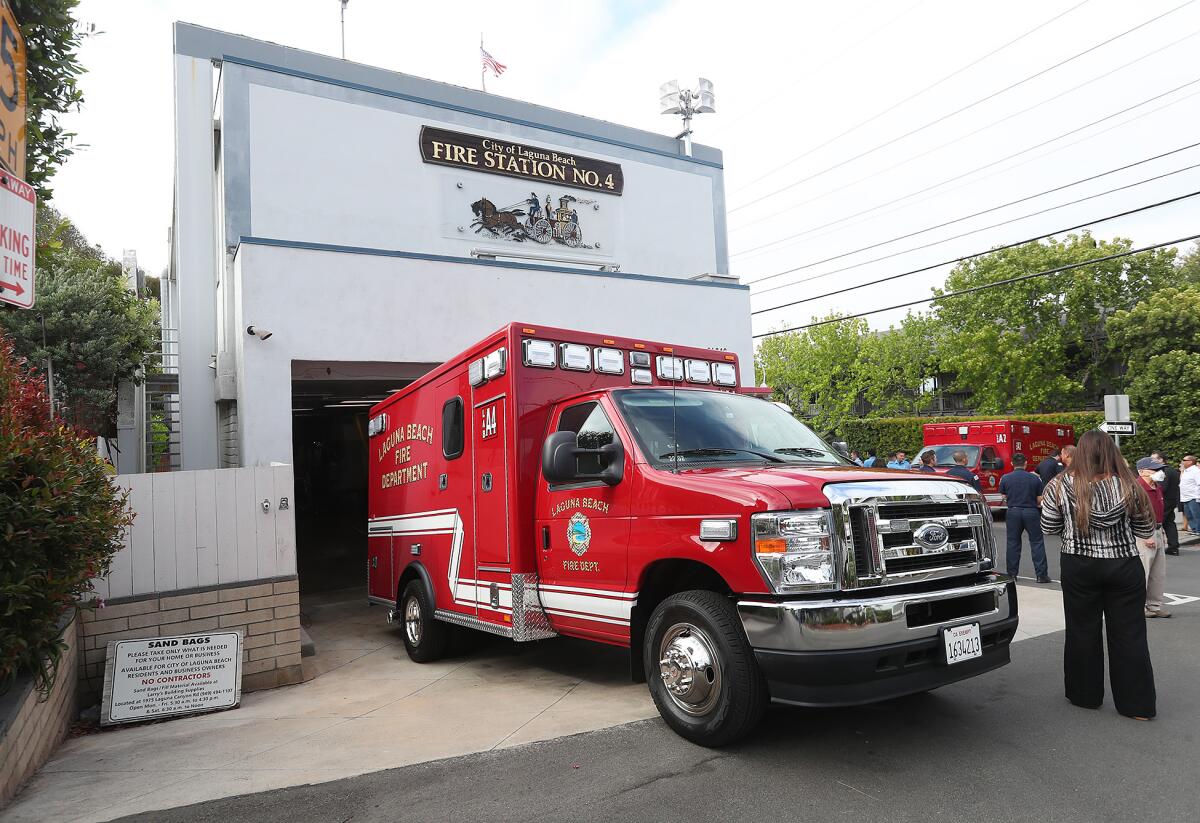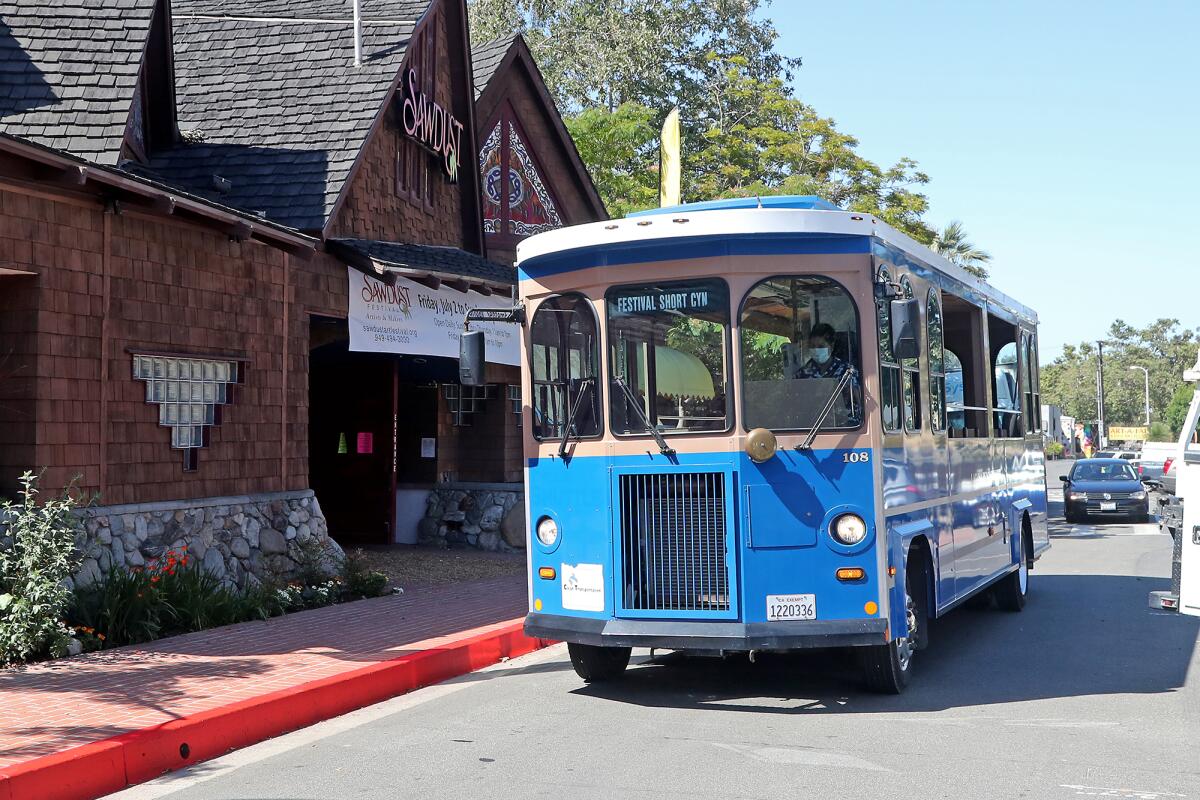Laguna Beach develops master plan for electrification of municipal vehicle fleet

- Share via
Laguna Beach has started down the road toward converting its municipal fleet to electric vehicles, as a master plan for the eventuality was brought before the City Council at its June 27 meeting.
The council called on city staff to study the cost and feasibility of such a transition two years ago. The master plan, developed with the consulting firm ICF, looks at fleet electrification and adding electric vehicle charging infrastructure to support the move.
“The overall objectives of this plan were first to look at how we could transition the city’s fleet to electric vehicles where operationally feasible,” Michael Litschi, director of transit and community services for the city, said. “So that includes looking at how the existing vehicles are used, how much time they have to charge overnight, and any special requirements of the vehicles that we use in the city fleet.
“Second is to develop a sustainable infrastructure plan, so obviously, you can go and buy an EV vehicle fairly easily, but the important thing is to have the charging infrastructure and the electrical grid infrastructure backing it up, so that you’re able to effectively operate those vehicles and ensure that they’re able to be charged in the places they need to be charged.”
The plan also evaluated the cost of a transition to an electric fleet and potential funding sources such as grant programs.
City officials believe that fleet electrification represents an opportunity for Laguna Beach to reduce its carbon footprint. As of 2018, 51% of the city’s greenhouse gas emissions were connected to its vehicle and transit fleet, Litschi said. Thirty-five percent of those emissions were from the trolleys, though Litschi said the data did not factor in the reduced emissions from taking drivers off the road.
Laguna Beach had 181 vehicles (164 on-road) in its municipal fleet as of June of 2022. Analysis provided by ICF indicated that 147 of the on-road vehicles could be transitioned to battery-electric and plug-in hybrid models. It also projected the cost of ownership of an electric vehicle fleet to be $1.1 million less than if the city continued to operate internal combustion engine vehicles.
If the plan to replace 147 fossil fuel vehicles with electric vehicles is implemented, city staff said it could reduce greenhouse gas emissions by 12,000 metric tons and nitrogen oxide emissions by 30,000 pounds over the life of the new fleet.
“These emission reductions are equivalent to taking 2,600 light-duty vehicles off the road for a whole year,” said Sam Pournazeri, senior director of clean transportation and energy for ICF.
Costs would approach $4.6 million to replace the city’s non-transit fleet with electric vehicles, and the associated charging infrastructure was estimated to be $650,000.
The California Air Resources Board is requiring municipal fleets to have 50% of their new vehicle purchases be zero-emission vehicles next year. In 2027, all new vehicles purchased should be zero-emission vehicles, according to the board’s Advanced Clean Fleets regulation.

Laguna Beach operates 25 propane-powered trolleys. Per the Innovative Clean Transit regulation from the state, all purchases of new transit buses exceeding 14,000 pounds must be zero emission by 2029. The transit fleet should be zero emission in its entirety by 2040.
The council accepted the master plan, and it adopted a resolution for a zero-emission bus rollout plan. Small transit agencies, such as the Laguna Beach Transit trolleys, had to submit a zero-emission bus plan by the end of June.
Conversion of Laguna Beach’s propane-powered trolley fleet to electric vehicles would cost approximately $1.6 million more than the city’s existing vehicles, according to a staff report. Upfront costs and a need for additional vehicles to maintain service levels account for the difference. The cost for an electric trolley is roughly $450,000, while the necessary charging infrastructure is expected to have a price tag of at least $1 million.
The city’s consultant found that the number of trolleys would need to expand from 25 to 33 upon transition to an electric fleet to support summer demand. The extra trolleys would be needed because of the vehicles’ limited range and time needed to charge.
“What we want to avoid is jumping in with both feet and buying a bunch of electric vehicles and then figuring out we don’t have the infrastructure we need to charge them,” Litschi said. “That’s been a mistake that’s been made by a lot of municipalities. … I’m very familiar with a lot of transit agencies who have gone down that road and have dozens of buses parked that they can’t use because they have no way to charge them.”
The council authorized the city manager to enter into an agreement with ICF for a multi-stage implementation plan, if it is less than $75,000, or return to the panel at a later date with a recommended consultant to develop such a phased plan. The goal is to transition a majority of the municipal fleet to electric options by 2035.
“This is going to continue to evolve and morph, depending on technology and a whole lot of factors,” Mayor Bob Whalen said. “Our implementation plan is going to have to be flexible.”
All the latest on Orange County from Orange County.
Get our free TimesOC newsletter.
You may occasionally receive promotional content from the Daily Pilot.








